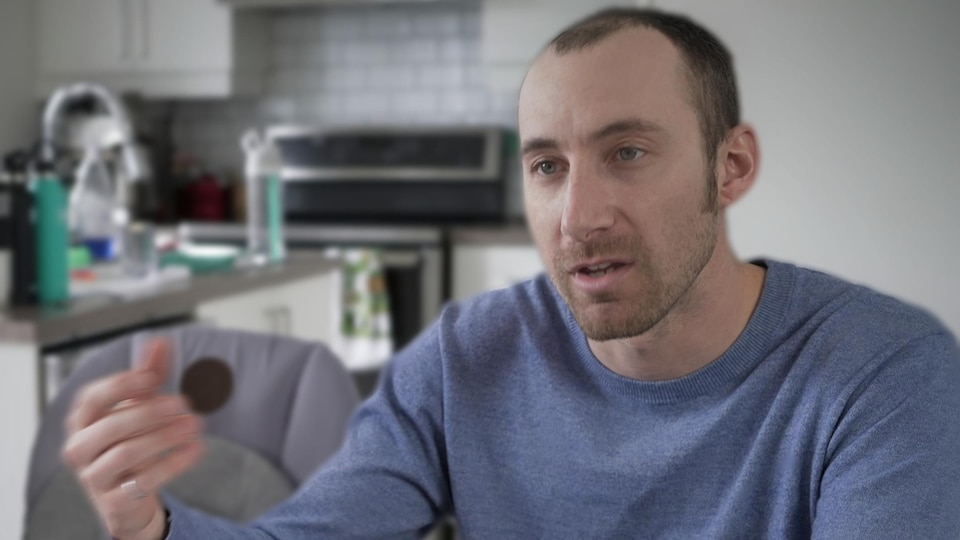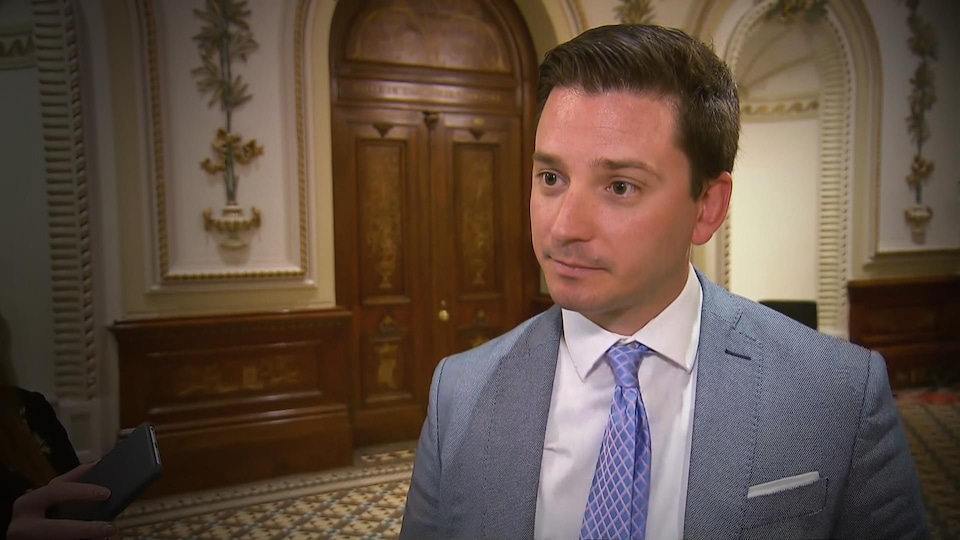A hole in the Civil Code leaves buyers of new homes without the possibility of knowing if subcontractors have been paid. This flaw, however, denounced by the Chambre des notaires du Québec for more than 25 years, has still not been corrected.
Current Justice Minister Simon Jolin-Barrette made the commitment in September 2018, in a report by Will pay, to change the provisions to better protect consumers, like this couple from Sainte-Marthe-sur-le-Lac. But nothing has yet been done about it, which the president of Quebec’s Notary Chamber, Hélène Potvin, regrets.
” Nothing has changed since the report was released. The provisions of the Civil Code are always the same. So yes, unfortunately, this situation could happen again. “
Lost money
In 2018, Raphaëlle Viau and Olivier Bélisle built their very first house built by Habitex Construction. After signing the deed of sale with the notary and the complete delivery of the sale price, that is $ 329,000, their nightmare began.
The doorbell of their new home rang incessantly as the bailiffs followed each other to give them notices of the legal hypothec of the construction. A document informing them that a subcontractor intends to register a mortgage on their home.
” Legal mortgage, we do not really know … Then we go to the Internet, we look. Here we see that we are somewhat deceived. “
The couple understands that the money paid to Habitex Construction was not used to pay the subcontractors who built their home. Therefore, these subcontractors use a legal construction hypothec to get paid. They try to contact Kitty Tourangeau, the company’s owner, and Daniel Méthot, the project manager, without success. They disappeared.
The work of the notary is in question
The work of the notary is directed because, in their deed of sale, it is clearly stated that the sub-contractors all paid for, which is not true.
” I don’t think we were protected enough. I thought that when buying a new house, the notary is there to do this kind of verification. “
However, the current provisions of the Civil Code of Quebec governing legal construction hypotheses do not allow notaries to know whether subcontractors have been paid. In fact, until the end of the work, the buyer can only rely on the goodwill of his contractor to find out if the subcontractors ’invoices have been paid.
” There is an unbalanced force over which construction contractors have more rights and the buyer has no way to defend himself. “
Do everything you can not to lose their home
For Raphaëlle and Olivier, the threat of losing their home was very real. To prevent subcontractors from seizing their home and then selling it and paying themselves the sale price, the couple quarreled with their lawyer.
” It’s a war against legal mortgages that we’re claiming right now, moreover that at the same time, we’re fighting our contractor. “
Over the past three years, the couple has negotiated with several subcontractors, sometimes successfully, while other mortgages have been canceled because the deadlines provided for Quebec’s Civil Code were not respected. They still have to pay $ 35,000 out of the $ 80,000 they were asked to pay, even if they already paid that amount at the time of purchase. And attorney fees are not included.
15 recommendations to protect consumers
In the spring of 2021, to resolve the situation, the Chambre des notaires du Québec submitted an expert report to the Ministère de la Justice du Québec with 15 recommendations. (New window). The goal: to restore a better balance between players in the construction and renovation community and consumers.
Two of the suggested recommendations may have averted the nightmare experienced by Raphaëlle and Olivier. The first suggests that a subcontractor who wants to exercise himself in the rights of a legal construction hypothec is obliged to disclose his contract in the land register, Ms. explains. Potvin, president of the Chambre des Notaires du Québec. And that would actually be possible to have information on companies that worked on residential construction.
The second recommendation that will change everything for the couple is to limit the time to register a legal construction hypothec. So what we are proposing is that it is no longer possible to register a mortgage once the general contractor has sold the property to the consumer.summarizes Ms. Potvin.
So, there are no more unpleasant surprises when you go to the notary, as happened to the clients of Habitex Construction.
Other recommendations address the prohibition of seizing primary residence for debts of less than $ 20,000 or the creation of a housing administrative tribunal to hear claims related to property owners.
The promise not kept by Simon Jolin-Barrette
If the Chamber of Notaries decides to act, on the part of the government, the file is in the review stage.
In the fall of 2018, while Quebec was in the middle of an election campaign, Will pay specifically challenged Simon Jolin-Barrette, the then deputy of the CAQ, on the solution proposed by the Chamber of Notaries, i.e., the notary ensures that subcontractors are paid.
He then said he was in favor of the proposal and promised to better protect consumers. The Chambre des notaires proposal seems to us to be a reasonable proposal aimed at protecting the public and ensuring that both subcontractors are paid, that the promoter is paid, but also that the citizen is protected when making one of the largest purchases. of his life, buying a house.
So yes, the CAQ is committed to changing the rules associated with legal hypothecstand by Simon Jolin-Barrette.
Asked about the progress of this file, the Minister’s office responded to an email that the question of legal hypothec in construction represents a particularly sensitive file for the Minister, but it is a complex file. It was explained that community stakeholders had been consulted and surveyed, but work was still underway.
When I see the consequences in your report, we cannot give up on the fightstatement by Hélène Potvin, president of the Chambre des notaires du Québec. We need to change things. So I have high hopes that we will succeed in convincing the government to act quickly. So we don’t give up. We continued our work.
Source: Radio-Canada



